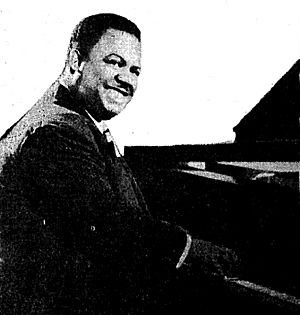Meade Lux Lewis facts for kids
Quick facts for kids
Meade Lux Lewis
|
|
|---|---|

Lewis in a 1944 advertisement
|
|
| Background information | |
| Birth name | Anderson Meade Lewis |
| Born | September 4, 1905 Chicago, Illinois, U.S. |
| Died | June 7, 1964 (aged 58) Minneapolis, Minnesota, U.S. |
| Genres | Boogie-woogie, piano blues |
| Occupation(s) | Musician |
| Instruments | Piano |
| Years active | 1920s–1964 |
| Labels | Paramount, Parlophone, Blue Note, Decca, Asch, Vocalion, V-Disc, Victor, Solo Art |
Anderson Meade Lewis (born September 4, 1905 – died June 7, 1964), known as Meade Lux Lewis, was an American pianist and composer. He is famous for his special way of playing the piano, called boogie-woogie style. His most well-known song, "Honky Tonk Train Blues", has been played by many other musicians.
Contents
About Meade Lux Lewis
Early Life and Music
Anderson Meade Lewis was born in Chicago, Illinois, on September 4, 1905. When he was young, he was inspired by another great pianist named Jimmy Yancey.
Meade's father was a guitarist and helped him start learning music. Meade first took violin lessons. But when he was 16, after his father passed away, he stopped playing the violin and switched to the piano.
How He Got His Nickname
Meade's friends gave him the nickname "Lux." He used to pretend to be characters from a funny comic strip called Alphonse and Gaston. As part of his act, he would stroke an imaginary beard. Because of this, his friends started calling him the "Duke of Luxembourg," and the name "Lux" stayed with him for the rest of his life.
Friendship with Albert Ammons
Meade Lux Lewis became good friends with another famous pianist, Albert Ammons, when they were children. Their friendship lasted their whole lives. They even went to the same school for a short time. They often practiced and learned piano together at the Ammons family home.
First Recordings and Fame
Meade Lux Lewis made his first recording in 1927. It was his famous song "Honky Tonk Train Blues", released by Paramount Records. He recorded this song again several times over the years.
A very important moment for Lewis was in 1938. He performed at a special concert called From Spirituals to Swing at Carnegie Hall in New York City. This concert helped him become well-known to the public.
The Boogie-Woogie Trio
After the Carnegie Hall concert, Lewis often played with two other amazing pianists from the show: Albert Ammons and Pete Johnson. They formed a trio and became the most popular boogie-woogie pianists of their time.
They played for a long time at a famous club called Café Society. They also toured together as a trio. Their success even helped inspire the start of Blue Note Records in 1939. Because of them, boogie-woogie music became very popular for about ten years!
Meade Lux Lewis in Movies
Meade Lux Lewis also appeared in a few movies. He was in New Orleans (1947) and Nightmare (1956). You might also spot him playing the piano in a scene in the classic movie It's a Wonderful Life (1946), though he wasn't officially credited for that role.
Later Life and Passing
Meade Lux Lewis really liked the Minneapolis area because his niece lived there. He would visit as often as he could. He often played at a restaurant called the White House in Golden Valley.
Sadly, Meade Lux Lewis died in a car accident in Minneapolis, Minnesota, on June 7, 1964. He was 58 years old.
Meade Lux Lewis's Legacy
The Famous "Honky Tonk Train Blues"
Meade Lux Lewis's most famous song, "Honky Tonk Train Blues", is still remembered today. Many other artists have recorded their own versions of it, sometimes even with a big band.
Some of the early musicians who recorded this song include Adrian Rollini and Frankie Trumbauer. Even classical harpsichordist Sylvia Marlowe and organist George Wright played it! Later, Keith Emerson from the band Emerson, Lake & Palmer often played it. He even had a hit song with it in 1976.
Mentioned in Books
Meade Lux Lewis is also mentioned in several books. He appears in Chapter 81 of the novel Cat's Cradle by Kurt Vonnegut. He is also mentioned in The Moving Target by Ross Macdonald and in the autobiography Life by Keith Richards.
Discography
- 1941: Boogie Woogie (a collection of songs), Columbia C44
- 1955: Boogie Woogie Piano and Drums, Clef
- 1975: Tell Your Story, Oldie Blues OL 2805
- 1982: Giant of Blues and Boogie Woogie 1905–1964, Oldie Blues OL 2810
- 1984: Chicago Piano Blues and Boogie Woogie 1936–1951 Vol. 3, Oldie Blues OL 2827
See also
 In Spanish: Meade Lux Lewis para niños
In Spanish: Meade Lux Lewis para niños

